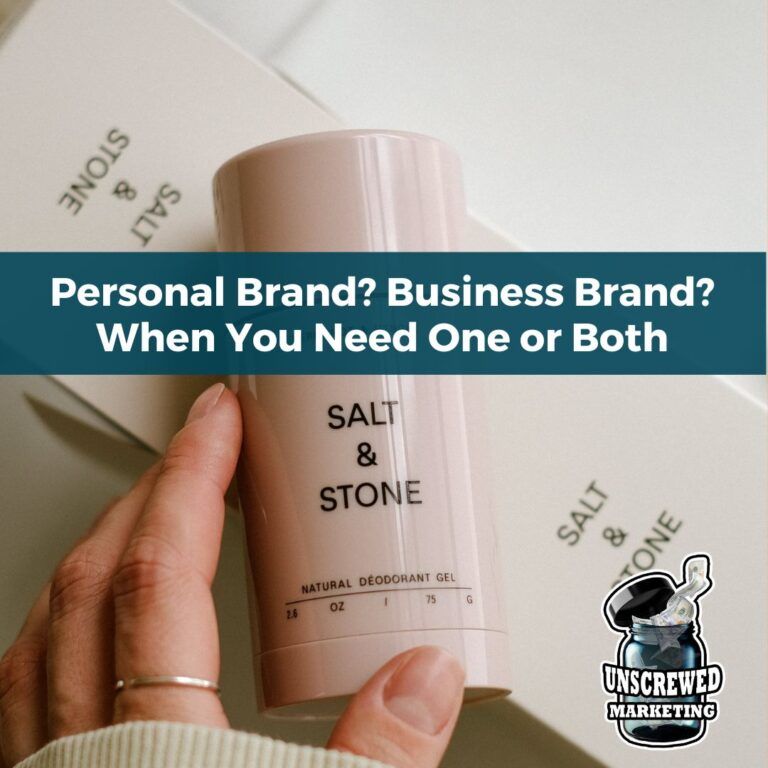- +1 512-591-8295
- [email protected]
- Mon - Fri: 9:00 - 16:00
- +1 512-591-8295
- [email protected]
- Mon - Fri: 9:00 - 16:00
Use code MOM50 at checkout thru Mother’s Day to get 50% off any gift card for marketing services

You’ve spent time crafting your business brand—logo, tagline, color palette, maybe even a beautifully designed website. But now you’re wondering: do I need to build a personal brand too? Or is that just for influencers and podcasters with selfie rings?
The answer depends on how you want your business to grow—and whether you want to be the face of it forever.
Let’s break down what personal branding really is, how it works alongside your business brand, and when it’s time to intentionally focus on both.
Let’s start by cutting through the noise: your personal brand is not your headshot and a trendy Instagram bio. It’s your reputation. It’s what people associate with you—your values, your voice, your presence.
Where your business brand communicates what your company stands for, your personal brand is about how you show up in the world.
For entrepreneurs, especially those who work with other professionals (the B2P crowd), your personal brand often acts as the first filter:
This isn’t about being famous. It’s about being recognizable for something meaningful—something that opens doors, attracts clients, and makes people listen when you speak.
In the early stages of a business, your personal brand and business brand are often one and the same. Especially if you’re a solo entrepreneur or consultant, people aren’t hiring a company—they’re hiring you.
That can work well at first. One of the fastest ways to build traction is to lead with your personal story and voice. That builds trust. People buy from people, especially people that they trust.
But here’s the problem: as your business grows, that connection can become a constraint.
That’s exactly why I went through a planned rebrand from “Vicky Wu Marketing” to Unscrewed Marketing. The business was my brand for a long time; and that was intentional because people locally in Texas knew me and my expertise. But I also knew if wanted the company to grow beyond me—to bring on a team, to sell broader services, to eventually step out of the day-to-day—it had to stand on its own. That’s why I knew I would be rebranding eventually (but a pandemic sort of slowed those plans down, during a time when so much of the economy is impacted is not when you probably want to be making such a huge change).
Compare that to someone like Elon Musk, whose personal brand is so tightly woven into his companies that anything he does or says can cause stock prices to swing. Whether that’s genius or chaos depends upon the day and what he may have said or done that day—but it highlights how entwined those identities can become.
Yes. But your role changes.
When you’re no longer a solo act, your personal brand isn’t about being the only voice. It’s about being the strategic one—the one that elevates your business, positions you as a thought leader, and supports the credibility of your team.
Part of why Unscrewed Marketing is so effective in helping our clients is because everyone has access to my level of expertise at the helm. So in this case, a personal brand that coordinates with the business is beneficial.
Think of it like this:
You still show up on podcasts. You still speak on panels. You still write posts that spark conversations. But instead of doing it to promote you, you do it to spotlight your company’s expertise.
Clients may or may not interact with you directly anymore—but they’ll feel more confident if they can trust the person behind the business.
Ask yourself:
If you said yes to any of these, it’s time to build (business) brand equity that lives outside of your (personal) name—but also supports it.
And it’s not just for solo entrepreneurs or founders. There are plenty of situations where building a personal brand makes strategic sense—even if you’re not “the business” on paper:
If people are choosing you, not just the company behind you, your personal brand is already happening. The only question is whether you’re shaping it—or letting others do it for you.
Some other careers where you may want to develop a strong personal brand:
These all fall into that middle space your audience often lives in: experienced professionals who aren’t beginners, but who haven’t been told how to strategically use personal branding in a way that feels smart, not self-promotional.
Your personal brand doesn’t need to be “big”. It needs to be clear.
And it should work in conjunction with your business brand, not against it.
You don’t need a 10-step funnel. You don’t need to go viral. You don’t need a personal logo. You need consistency in your brand voice.
Here’s how to get started:
Remember, you’re not creating a new brand—you’re strengthening the human side of the one you already have.
There’s a tipping point where a personal brand can become a liability.
Elon Musk is the extreme example, but many entrepreneurs fall into this category without realizing it:
For founders who love the spotlight, this might seem fine … until a crisis hits, or burnout sets in.
That’s how you build longevity.
You don’t need a massive platform. You don’t need a YouTube channel or TikTok persona. But you do need clarity.
Whether you’re a one-person powerhouse or leading a team of 20, your personal brand plays a role.
Use it to amplify your message. Use it to accelerate trust. Use it to build something that lasts—beyond you.
Start with your voice. My AI-Assisted Brand Voice Guide Workshop will help you uncover the words, tone, and messaging that make people stop scrolling and start listening.
Because your business brand matters. But so does the person behind it.
Leverage AI tools to create consistent and engaging content effortlessly.
Enhance your marketing strategy with clear, actionable phrasing.
Collaborate effectively with your team using a unified brand communication guide.
Brand Strategist • Fractional CMO • Artist Who Still Cringes at Bad Logos
Before I ever touch colors or logos, I help entrepreneurs uncover what their brand actually needs to say. With over 30 years in marketing and a background in fine art and commercial design, I guide clients through the kind of brand clarity that turns confusion into confidence—and yes, sometimes that starts before you even have a name.
I’ve helped nonprofits, startups, and multi-billion-dollar companies rebrand from the inside out. My process blends psychology, emotion, and positioning strategy so that everything from your messaging to your visual identity finally clicks. I’ve even had logos for large corporations in use for 25+ years—but my real joy is watching entrepreneurs light up when their brand finally feels right.
Because branding isn’t just about how it looks. It’s about how it works.

Vicky Wu, CEO
Author

This website uses cookies to ensure you get the best experience on our website. By continuing to use the website, you agree to our use of cookies. We do not share or sell your information. More info